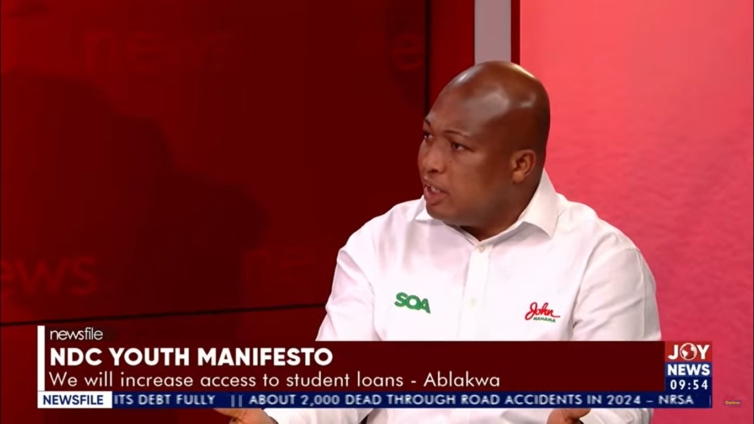
Audio By Carbonatix
The Member of Parliament for North Tongu, Samuel Okudzeto Ablakwa, has explained that one of the ways by which a future National Democratic Congress (NDC) government would fund the proposed 'No-fees policy' for level 100 university students, is to rely on the Ghana Education Trust Fund (GETFund).
This comes after a section of Ghanaians questioned how the 2024 flagbearer of the National Democratic Congress (NDC), John Mahama was going to fund the policy if he wins the election.
The policy was announced at the launch of the NDC's Youth Manifesto.
Related: Level 100 students won’t pay fees if I’m elected – Mahama
According to Mr Mahama, this is part of a government initiative to lessen the burden on parents financing the cost of their children's education.
Many critics have since cited the economic situation of the country and alleged that the former President was making empty promises to garner votes
But speaking on Joy FM’s Newsfile on Saturday, August 17, Mr Ablakwa said the Mahama administration would uncap GETFund to generate additional funds to finance the ambitious policy.
According to him, preliminary analysis has revealed that the cost of implementing the policy would range between GH₵250 million and GH₵300 million annually.
An amount, he insisted, can be attained if the capping law introduced by the incumbent government is reversed.
“We are saying that two things must happen to the GETFund, we must uncap and we must stop this Daakye Bond and collateralisation. The incumbent government introduced this capping law and what that law has done is that all the statutory funds have created a ceiling so not all funds go to the agencies. So whether it is GETFund, NHIA, and District Common Fund etc. the capping has limited their funds,” he explained.
Citing an example, Mr Ablakwa said NDC MPs were astonished to learn that, despite GH₵7 billion being accrued into the GETFund, only GH₵3 billion was available for use due to the capping and obligations tied to the Daakye Bond.
The lawmaker further assured that the NDC has conducted thorough analysis and research, confirming that by removing the cap and eliminating collateralisation, the GH₵4 billion currently inaccessible would be freed up.
These funds, he said would then be channelled towards financing the policy to provide grants to all Level 100 students, ensuring broader access to tertiary education in Ghana.
Meanwhile, Mr John Mahama, speaking at a Youth Town Hall Meeting at Ho Technical University, also responded to concerns about the funding for the policy, pointing out that wasteful government expenditures would be redirected to fund the initiative.
Latest Stories
-
GoldBod summons 6 gold service providers over compliance exercise
15 minutes -
Power disruption expected in parts of Accra West as ECG conducts maintenance
18 minutes -
Police investigate alleged arson attack at Alpha Hour Church
49 minutes -
Heavy Sunday downpour wrecks Denyaseman SHS, schools, communities in Bekwai Municipality
50 minutes -
Ridge Hospital is in critical condition – GMTF Boss appeals to corporate Ghana
1 hour -
Introduce long term measures to tackle challenges in cocoa sector – IERPP to government
1 hour -
Agricultural Economist proposes blended financing model to support cocoa sector
2 hours -
NPP MP warns against reducing producer price as government rolls out cocoa reforms
2 hours -
Tano North MP urges halt to grain exports over food glut
2 hours -
Farmers hopeful as government moves to expedite cocoa payments
3 hours -
Tensions at Agbogbloshie market women oppose AMA drain cleaning exercise, items confiscated
3 hours -
Lyse Doucet: In Tehran, rallies for Iran’s revolution overshadowed by discontent and defiance
3 hours -
Education Minister orders full audit of free sanitary pads in schools over quality concerns
3 hours -
IGP promotes 12,000 police officers, clears all backlog
3 hours -
Buduburam firefighters prevent gas explosion at Big Apple
3 hours

